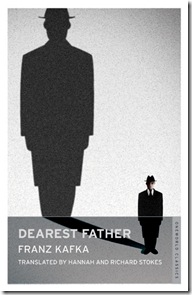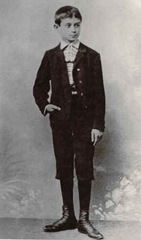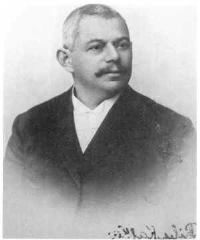
My writing was all about you; all I did there, after all, was to lament what I could not lament on your shoulder. – Franz Kafka
There must be very few authors whose name alone is enough to conjure a whole world view. Beckett would certainly be one but I would put forward that Franz Kafka would top the general public's list. In fact can any author be as easily recognised simply by his initial, K? And yet the man who gave the world the adjective 'Kafkaesque' (apparently the only word in common English use which derives from German literature) bemoaned the fact that he himself was not a typical Kafka; if anything he was the complete antithesis of what he perceived a true Kafka to be.
The standard to which he aspired was embodied by his father, Hermann Kafka, whom he describes as
. . .a true Kafka in strength, health, appetite, loudness of voice, eloquence, self-satisfaction, worldly superiority, stamina, presence of mind, understanding of human nature, a certain generosity, of course also with all the faults and weaknesses that go with these advantages and into which you are driven by your natural disposition and sometimes your hot temper.
Of course the man had his faults but they get brushed under the carpet almost, summarised simply as "all the faults and weaknesses" and yet when Franz talks about himself it is his negative qualities that come to the fore. He describes himself as a "weak, anxious, hesitant, restless person".
Physically also they were very different, these differences being especially noticeable when Franz was a boy. He recollects when they went swimming:
I remember, for example, how we often undressed in the same cubicle. I, skinny, frail, fragile, you, strong, tall, thickset. Even in the cubicle I felt a puny wretch, and not only in front of you but in front of the whole world, because for me you were the measure of all things.
He was proud though of his father's physique. He was the one who had failed in some way to be like him. He was the one consumed by guilt. Hermann was oblivious to it all.
Many people have grown up with overbearing fathers. I, for one. I always excused my own father (up to a point anyway) assuming that he was a product of a generation whose attitudes are thankfully now dying out somewhat, but it is impossible for me not to acknowledge the effect that, as a father, he had on me both the negative and the positive. In some cases I tried to emulate him, in others I wanted to be nothing like him. I have no doubt a lot of you reading this will be nodding in agreement. Of his father Kafka said (although he could just as easily have been talking about mine):
In your armchair you ruled the world. […] For me as a child though, everything you barked at me was as good as God's law, I never forgot it...
 The characters of all sons are inevitably shaped by the fathers but Kafka more than most, in fact it is debateable that we would have the word Kafkaesque today if it weren't for the fact that Hermann Kafka didn't have the wrong son. Oh, Franz was his, the only one of his three sons to reach adulthood (I'm not suggesting otherwise), but if ever there existed as an example one could cite to disprove the old adage 'like father like son' then this would be it. Franz says:
The characters of all sons are inevitably shaped by the fathers but Kafka more than most, in fact it is debateable that we would have the word Kafkaesque today if it weren't for the fact that Hermann Kafka didn't have the wrong son. Oh, Franz was his, the only one of his three sons to reach adulthood (I'm not suggesting otherwise), but if ever there existed as an example one could cite to disprove the old adage 'like father like son' then this would be it. Franz says:
I would have been happy to have you as a friend, a boss, an uncle, a grandfather, even indeed (though rather more hesitantly) as a father-in-law. It is only as a father that you have been too strong for me. . .
Hermann is probably one of the most inflexible individuals I have ever read about – if I can believe everything I've read (Franz freely admits he is prone to exaggeration with regards to him) – and yet nothing I have read about his father suggests for a moment that he was a bad man. He was at times manipulative but whenever he was, it was to get his way. Because his way was right. A good example, and the one Franz himself provides, is Hermann's heart condition:
[Your] heart condition is at the very least a means by which you dominate more absolutely, as the mere thought of it is enough to stifle any contradiction.
He was also something of a hypocrite and Franz cites his double-standards particularly when it came to religious observances and table manners. In the former area Franz had imagined that this would provide a common ground for them but he was wrong; his father only paid lip service to his faith. The latter is given more weight in the text than one might expect because, as a child, this seems to be the only time Franz interacted with his father. Who would ever imagine so much damage could be done to a young boy at the dinner table? Not that he was the only one to suffer but I'll come back to that.
What is of particular interest is the fact that Kafka goes to great pains not to lay the blame squarely at his father's door for his own shortcomings. "It is very possible," he says, "that, had I grown up entirely free from your influence I still l could not have become a person after your own heart". He even goes as far as to commend Hermann as a father: "You have, I think, a gift for bringing up children..." There, I have to say, I think he is stretching a point too far. If Hermann only treated Franz badly then there might be evidence to back up that statement. The fact is, and his son himself provides the proof, Hermann treated all his children (along with members of his extended family and his employees) in much the same way. And because of who he was Franz acknowledges:
Your effect on me was the effect you could not help having. […] [W]hat I have become, I have become (excepting my innate disposition and any external influences, of course) through the combination of your upbringing and of my obedience.
And yet, for all of the above, Hermann Kafka was not a violent man. Oh, he might sweep some goods off a counter at work in a fit of temper (he was a partner in a fancy-goods shop) and there were times when he spanked his children but that was the extent of that. Words were his weapon of choice and he wielded them like a bludgeon rather than a rapier:
The rhetorical devices you used in bringing me up, which were extremely effective, and at least in my case never failed, included: insults, threats, irony, spiteful laughter, and – oddly enough – self-pity.
[…]
You … lashed out with [your words] without a second thought, you felt sorry for nobody, either during or afterwards, people were left utterly defenceless.
[…]
It is also true that you hardly ever really beat me. But the way you screamed and went red in the face, the way you hastily undid your braces and hung them over the back of the chair – this was almost worse for me. Imagine a man who is about to be hanged. Hang him and he is dead, it is all over. But force him to witness all the preparations for his hanging and inform him of his reprieve only once the noose is dangling in front of his face, and you can make him suffer for the rest of his life.
Some of Hermann's insults have to be heard to be believed. Of Franz:
You intensified your abuse with threats, and these sometimes were aimed at me. I found this one particularly terrifying: "I'll gut you like a fish" – of course I knew that nothing worse would follow (as a small child, admittedly, I did not know that) but it tallied with my impression of your strength that you would have been capable of it.
Of his daughter, Gabriele (nicknamed 'Elli'):
For me it was an orgy of malice and Schadenfreude when you referred to her … at almost every meal: "Look at the fat cow, she has to sit ten metres from the table"…
NB: in the earlier translation Schadenfreude is rendered as "spiteful delight" although 'gloating' might work better.
And of an employee who had TB:
The cripple should hurry up and die.
NB: this differs quite radically from the earlier translation which renders this as: "The sooner that sick dog croaks the better." I suspect this may be a more accurate transliteration since the original German is: »Er soll krepieren, der kranke Hund« and krepieren is the equivalent of the English slang expression 'kick the bucket' or 'snuff it'.
His bluster aside, once you got under Hermann Kafka's skin one has to wonder if he had a soft side. People listening to how he spoke to his son might think he never loved him. This is quite untrue. Franz never wanted for anything for his entire life except perhaps demonstrations of love and affection that were beyond his father's ability to give. Franz makes this point when he mentions a time when, as a child, he was ill:
[T]he last time I was ill … you came silently to me in Ottla's room, standing in the doorway and merely peering to see me in bed, acknowledging me with a single considerate gesture of your hand.
I get that. Neither of my parents was particularly physically demonstrative towards me although much of the fault there lies with me it has to be said. ('Ottla' was the nickname of Kafka's sister Ottilie by the way.) What is really sad about the account that Franz gives is what he goes on to say next:
You have a particularly wonderful, very rare sort of serene, satisfied, approving smile that can make a person truly happy. I cannot remember any particular occasion on which you bestowed it on me as a child, but it probably happened at some stage…
He assumes his father smiled at him as a child. He can't remember. Now that is sad.
I am a writer. Words are how I respond to the world. And yet I find that in my own writing I have rarely tackled the subject of my relationship with my father. There are three or four poems written after his death but nothing while he was alive. There was never any real need because I could talk to my dad. Franz was not so fortunate. When he tried he was told to be quiet:
Our inability to get on calmly had one more very natural consequence: I lost the ability to speak. I probably would never have turned out to be a great speaker in any case, but I would at least have grasped language to a normal degree of fluency. However, you forbade me to speak from a very early age: your threat, "Not a word in contradiction!" together with the image of your raised hand, has haunted me ever since I can remember.
So what does he do? Eventually, in his mid-thirties while recovering from tuberculosis at the sanatorium in Schelesen, he puts pen to paper and writes his father a letter. And what a letter. All of the quotes above come from it and yet there is so much more. Franz talks about his childhood, his three sisters, his jobs, his attempts at marriage, his writing, Judaism and more. It is a very detailed summing up of his relationship with his father. It is balanced, too, because it would have been easy to blame his father for everything that ever went wrong in his life although there is ample evidence that his father did have a hand in most of Franz's failures, or if not a hand then at least a finger in the pie.

The original handwritten first page
The letter may not explain everything that we later read in Kafka's stories and novels but it is impossible to read The Metamorphosis or The Judgement without recognising many of the characteristics that defined Hermann Kafka. Take The Trial for example: one day men come to Joseph K.'s apartment and inform him that he has committed a crime and is to be put on trial. He never finds out what he has done wrong. Now read this, especially the final sentence. Pavlatche by the way is the Czech word for the long balcony in the inner courtyard of old houses in Prague.
I was whining persistently for water one night, certainly not because I was thirsty, but in all probability partly to be annoying, partly to amuse myself. After a number of fierce threats had failed, you lifted me out of my bed, carried me out onto the pavlatche and left me awhile all alone, standing outside the locked door in my nightshirt. […] This incident almost certainly made me obedient for a time, but it damaged me on the inside. […] Years later it still tormented me that this giant man, my father, the ultimate authority, could enter my room at any time and, almost unprovoked, carry me from my bed onto the pavlatche, and that I meant so little to him.
There are plenty of incidents of record where children have been treated in a similar fashion, e.g. by being locked in a cupboard or in a basement, and this has affected them for the rest of their lives. And I'm sure in the majority of the situations the parent would simply think they were being firm.
The fact is though that Franz's letter never reached its intended recipient. His mother certainly read it but that was it. One has to even wonder if he seriously intended his father to see it. It was amongst a bundle of papers entrusted to his friend Max Brod who was asked to burn them after his death. If Brod had done as he was bid then not only that letter, but everything Kafka had ever written would have been lost. Wisely Brod disobeyed his friend's request which is why we have one of the most influential bodies of work written in the German language preserved down to this day including the letter which has come to be known as Dearest Father.
This text has appeared in print before but was included amongst a collection of Kafka's fiction. Now, in a new translation, it receives proper attention as an important piece of writing in its own right. Although worked on over a period of time this is not however the most polished of texts and the translators have gone to great pains not to iron out some of Kafka's mistakes. This is very much a warts-and-all translation. But it is an eye-opener, too, and something any serious student of Kafka's will want to read. And I would suggest they read it slowly. It's a short book, 111 pages including an introduction, an appendix and a selection of Kafka's correspondence where he makes specific mention of his father, but Kafka's writing style here is often convoluted. Many of his sentences are longer than 100 words and contain frequent asides. It does fall into logical sections, although you probably won't realise this until you've finished your first read; a second will be far more revealing.
 The new edition has been published by Oneworld Classics. They're a new-ish publisher only appearing in March 2007. Their goal, as stated on their website, "is to expand the literary canon in the English-speaking world through a series of mainstream and lesser-known classics, often by commissioning new translations." In September 2007, Oneworld Classics acquired the legendary Calder Publications list. So, when they wrote and asked me to pick a book for review I couldn't decide. I desperately wanted The Philosophy of Samuel Beckett but I was also tempted by the Kafka. In the end, following a cleverly-worded e-mail, I got sent both and I don't feel a bit guilty about it.
The new edition has been published by Oneworld Classics. They're a new-ish publisher only appearing in March 2007. Their goal, as stated on their website, "is to expand the literary canon in the English-speaking world through a series of mainstream and lesser-known classics, often by commissioning new translations." In September 2007, Oneworld Classics acquired the legendary Calder Publications list. So, when they wrote and asked me to pick a book for review I couldn't decide. I desperately wanted The Philosophy of Samuel Beckett but I was also tempted by the Kafka. In the end, following a cleverly-worded e-mail, I got sent both and I don't feel a bit guilty about it.
On their site they say their Classics Critical Apparatus for most titles will include:
[A] section of up to eight pictures or photos, enabling the reader to “see” as well as read the text and its context.
A section concentrating on the personal and historical circumstances that shaped the author’s work, enriched by excerpts from letters, documents and other literary texts.
A list of the works written by the author in chronological order, accompanied by a brief description and commentary.
A short list of bibliographical resources (including websites) that the reader can refer to for further reading.
For most translations, a section consisting of three or four pages of the original text for the translated works.
Sadly, this particular edition was somewhat lacking in bells and whistles but what was presented was fine, perfectly adequate. I would have chosen footnotes rather than endnotes, but that's a personal preference. Also photos of Hermann and Franz Kafka would have been of some help. The wee one of Franz on the back cover is too small to be of any real use. But then that's why we have the Internet. The RRP is £7.99 which is comparable with similar books.
I have to comment on the binding. The cover illustration, although simple, was very striking and the card was thicker than you'd expect to find on most paperbacks; it felt nice in the hand and in the past I have bought books purely based on taction. The company promises "the most ambitious classics publishing project since Penguin and Everyman" and considering the competition and the head start their rivals have, I won't be holding my breath, but as a start it's a decent beginning.
As for the translation, I'm poorly placed to comment since my German begins and ends with danke schoen. The original text is available here however it is the translation by Ernst Kaiser and Eithne Wilkins; revised by Arthur S. Wensinger, which isn't nearly as fluid as the new one by Hannah and Richard Stokes who certainly express very clear ideas about how this new translation should read in their introduction:
A reader should not expect to have to stumble through a clumsy translation. But where the clumsiness is crucial to the essence of the original, surely it would be insensitive to remove it?
You'll have to buy a copy to decide. I'm hanging onto mine.
For further information on Kafka one would do much worse than explore The Modern World's website or The Kafka Project.


11 comments:
Fantastic post Jim, one of my all time favorites from you. Thanks for reminding me about this piece of Kafka's work. I have read it (in a very good Serbo - Croat -Bosnian translation) years ago, as a teenager. Now it is a right time to do it again, we all mature after all.
Thanks for that, Jasko - we do our best. I just wish I'd done some German so I could read the original. Translation, as you very well know, is not an exact science; indeed it veers towards being an art. Beckett translated most of his own works himself and literally rewrote whole chunks in the process, something he couldn't trust most translators to do without injecting themselves into the process.
I am already way over my book budget for the next few years, but I do believe that I shall have to have this one. You make these books so tempting. Why not review a few that you do not like - give me a chance to catch up? great post, though!
Thanks, Dave. I have to say, of all the books I've been sent over the last few months this has been the one that excited me the most (granted I got to choose which is always nice). If it's any help I started one a couple of days ago that hasn't really excited me that much but it could well get better. Let us hope for your sake at least that it does not.
Nothing to do with Kafka but my blog list hasn't been updating you! I thought you'd just gone quiet or still had the bad back or something. It hadn't updated since the minty fresh post so now I have quite a backlog of posts to get through...see you in a while...
x
Don't fret about it, Rachel. I actually noticed that when I was on your blog. Not sure what either of us can do about it though.
A monumental piece of compressed research, Jim, and a fascinating read for all of us for whom Kafka is more adjective than noun. Thanks for this.
Thank you for that. Dick. I have to say it was hard to trim the fat on this one because the fat was so tasty. I thoroughly enjoyed doing this one so much so that I almost forgot I was supposed to be reviewing a book.
I'm glad you didn't trim the fat -- now I have to track down my Kafka collection in preparation for reading this book. It's been too long.
Interesting, too, the power that parents can have. That power isn't an illusion, though I sometimes wish it were.
I have read only a few of Kafkas short stories, I enjoyed them in all their apparent oddity and intrigue.
I had no idea about his relationship with his Father. In fact, most of his biographical detials remained completely unknown to me until now.
Interesting to discover the dynamics in the relationships of people, equally of a writer too, and as expected perhaps, Kafka proved to be a sensitive spirit, never quite able to excert the confidence he had in person but distilled it through his writing.
Over-bearing Father syndrome. Interesting explanation, Jim.
Grazie tanto.
Jennifer, glad the post inspired you. I think it's obvious that the book inspired me too.
As for parents, well, maybe a subject for another day. Suffice to say that the power they have and the power we imagine they have are two quite different things. I've posted this before but in case you missed it this is a poem I wrote about my father.
THE END OF ALL ILLUSIONS
Yes, even granite men
melt in the rain in time.
And, McGuire, I have to say apart from this small book it has been years since I've read any Kafka. But after finishing it, and doing the research for this post, I think I might read a lot more into anything I read of his in the future.
Post a Comment